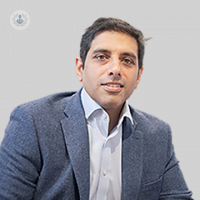Unraveling pancreatic cancer
Escrito por:In his latest online article, Mr Ricky Bhogal gives us his insights into pancreatic cancer. Pancreatic cancer, known as a stealthy and aggressive disease, has posed significant challenges for doctors and researchers. With its late symptoms and elusive nature, it's a tough opponent to tackle. However, recent progress in understanding this cancer offers some hope, shedding light on potential improvements in diagnosis and treatment.

Detecting pancreatic cancer
Pancreatic cancer's quiet progression is a major hurdle. Symptoms often don't show up until it's advanced, leading to poor survival rates. But scientists are working on ways to catch it early. They're exploring liquid biopsies, which analyses a tumours DNA in the blood, as a possible method to detect the cancer sooner.
Genetic clues: Understanding genetics' role
Genetics plays a big part in pancreatic cancer. Mutations in genes like BRCA1, BRCA2, and PALB2 increase the risk, especially in families with a history of cancer. Researchers are studying how these genetic changes interact with the environment, aiming to develop strategies to prevent the disease in those with higher risk.
Battle in the microenvironment: Fighting treatment resistance
Pancreatic tumours have a unique environment that makes treatment difficult. The dense tissue around the tumour limits drug delivery and supports tumour growth. Researchers are finding ways to target this environment, either by changing its makeup or delivering drugs to break it down. This could make existing treatments more effective and lead to new options.
Immune allies: Using the body's defences
Immunotherapy, a way to boost the body's natural defence against cancer, is making slow progress in treating pancreatic cancer. While these tumours often resist immunotherapy, scientists are finding ways to overcome this. Combining immunotherapy with other treatments, like targeted therapy or chemotherapy, could make tumours more vulnerable to the immune system's attack.
Personalised care: Tailoring treatment
Precision medicine, where treatment is based on a person's unique genetics and tumour characteristics, is gaining ground. Advances in genetic testing help identify specific changes in tumours. This information guides doctors to choose treatments that have the best chance of success and fewer side effects.
Conclusion
Pancreatic cancer remains a tough challenge, but recent progress offers a glimmer of hope. Early detection methods are in the works, genetics is revealing its secrets, and the stubborn tumour environment is being targeted. Immunotherapies are showing potential, and personalised treatment approaches are becoming more feasible. As experts collaborate, the mystery of pancreatic cancer is slowly unravelling, bringing renewed hope to the fight against this disease.
Mr Ricky Bhogal is a highly regarded consultant hepatobiliary surgeon with over 20 years of experience. You can schedule an appointment with Mr Bhogal on his Top Doctors profile today.


